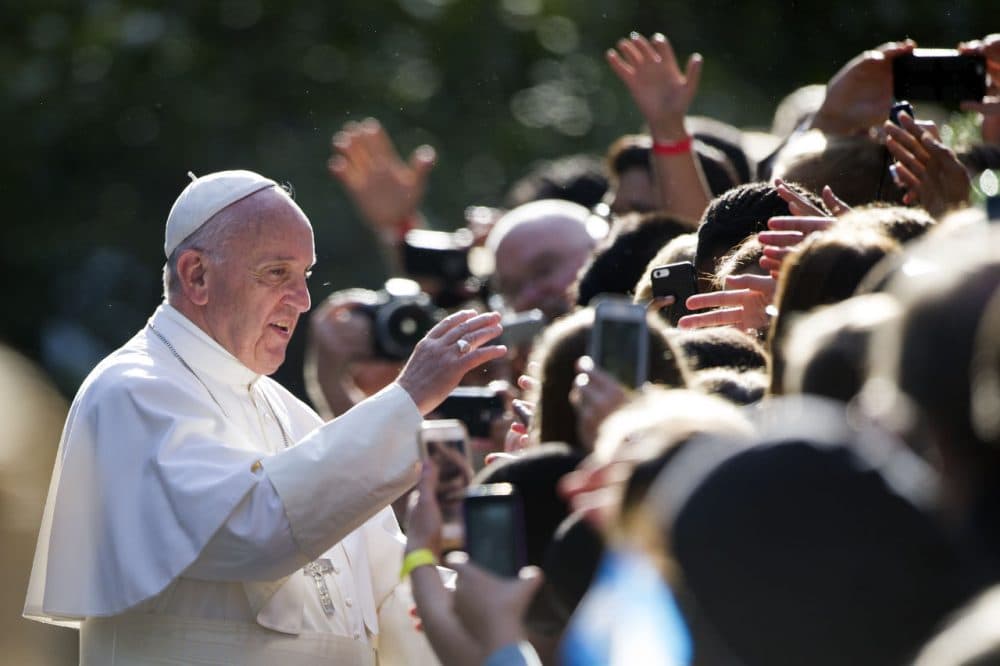Advertisement
America's Long And Complicated History With Catholicism
Resume
Pope Francis received a warm welcome on Thursday speaking to a joint meeting of the United States Congress.
It is just one stop of many where the pontiff has been greeted by cheers from supporters Catholic and non-Catholic alike. But just a century ago, Catholics struggled for acceptance in America. Gail Collins writes in The New York Times that the nuns in her Catholic school would stress their isolation, "they kept prepping us to be ready to die for our faith at any moment." Fifty-five years ago, John F. Kennedy gave a speech assuring leery Americans that he would maintain separations of church and state and not thrust his Catholic religion on the nation.
How did the U.S. change from a nation that struggled with anti-Catholic sentiment, to one that celebrates the visit from the pope of the Holy See?
Here & Now's Robin Young speaks with historian Kathleen Sprows Cummings for a look.
Interview Highlights
On how perception of Catholics in America has changed over time
"The historical part of my brain is marveling that this is actually happening, when we consider the not too distant history of Catholicism in this country and the way it was perceived. The fact that a pope is being welcomed so effusively, and all of his appearances being viewed as something that is great for the nation, really represents a dramatic historical turnaround."
On what the public sentiment was like 50, 75 years ago
"Within our living history, the election of John F. Kennedy: Kennedy had to promise, in order to be a viable candidate, that the pope would not tell him what to do. He had to promise that he wouldn't seek to establish official diplomatic relations between the United States and the Holy See - that relationship only became official in 1984 under President Ronald Reagan. Kennedy also had to promise that if elected, he would not seek federal funding for parochial schools. He had to answer concerns that his loyalties would be to the pope in Rome rather than to the Constitution."
On this history reflecting questions surrounding other religious cultures today
"It resonates completely. ... I think there are some people, some Catholics, who remember the Kennedy challenges and remember these issues. But if you go a little farther back in history there were very prominent American intellectuals in the 19th century that believed that the pope was going to invade the United States, and in fact, that the Jesuits were in charge of this. When Catholic immigration to this country increased in the 19th century, there were people who said that Jesuits were actually directing immigrants to strategic points in the nation to prepare for such a papal invasion."
"In the 19th century, [the pope] had much more temporal power. He was a temporal prince in Italy. So there were concerns about what that meant, but people thought of the pope as a manipulative and foreign despot who had very real designs on the United States."
"Catholics occupy a much different position in American society today than they did for much of our nation's history."
On why the pope is resonating in America today
"They key to his popularity here in the United States for Catholics and non-Catholics is that from the very beginning of his pontificate he established a great deal of moral credibility in those early gestures, those symbolic moves he made in those first couple of days. He's continued that by fore-fronting issues that lead with the positive. He's said very early on that the church should focus on the things it says yes to - the message is about the positive - rather than all the things the church says no to. ..."
How Catholics in America got from then to now
"In the 19th century, there was a burning of a convent in Charleston, Massachusetts, because of fear of what were these women doing inside these convents, what were they educating, what were they doing to Protestant girls - were they keeping them captive? The convent was burned down in 1834. There were riots in Philadelphia - the place where Pope Francis will go on Saturday - over fears that Catholics were interfering with the city's public education, that they were trying to undermine the citizenship by interfering with that."
"It really is just unbelievable to see — Catholics are about 30 percent of Congress, a majority on the Supreme Court. Catholics occupy a much different position in American society today than they did for much of our nation's history."
Guest
- Kathleen Sprows Cummings, director of the Cushwa Center for The Study of American Catholicism at The University of Notre Dame. She tweets @KSprowsCummings.
This segment aired on September 24, 2015.